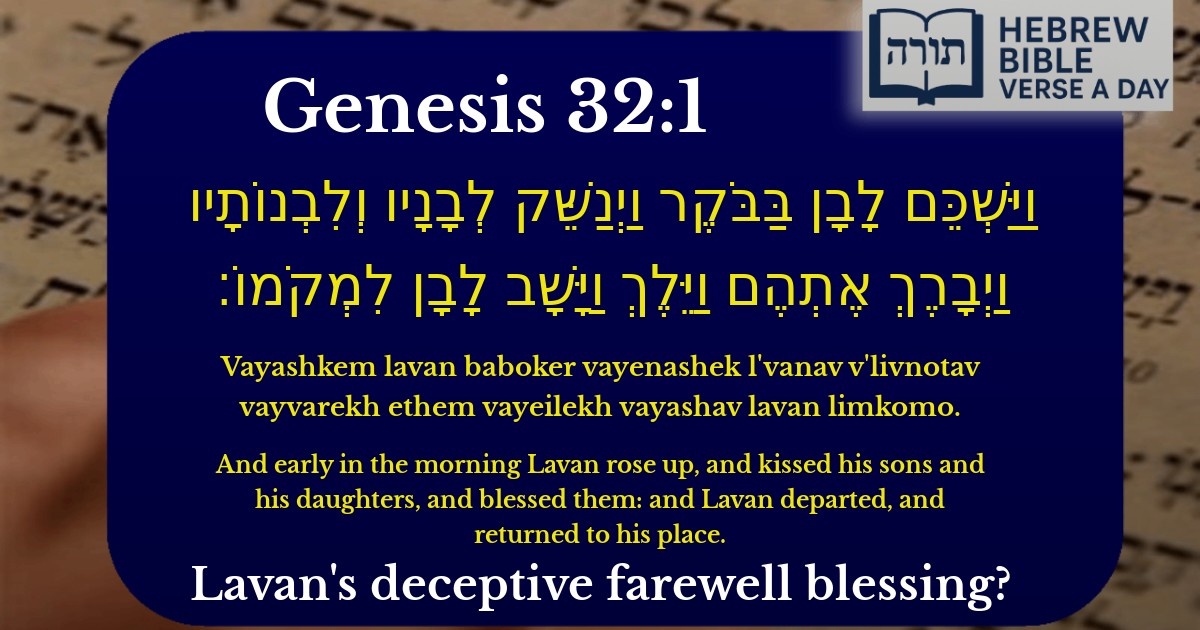Join Our Newsletter To Be Informed When New Videos Are Posted
Join the thousands of fellow Studends who rely on our videos to learn how to read the bible in Hebrew for free!
Hebrew Text
וַיַּשְׁכֵּם לָבָן בַּבֹּקֶר וַיְנַשֵּׁק לְבָנָיו וְלִבְנוֹתָיו וַיְבָרֶךְ אֶתְהֶם וַיֵּלֶךְ וַיָּשָׁב לָבָן לִמְקֹמוֹ׃
English Translation
And early in the morning Lavan rose up, and kissed his sons and his daughters, and blessed them: and Lavan departed, and returned to his place.
Transliteration
Vayashkem lavan baboker vayenashek l'vanav v'livnotav vayvarekh ethem vayeilekh vayashav lavan limkomo.
Hebrew Leining Text
וַיַּשְׁכֵּ֨ם לָבָ֜ן בַּבֹּ֗קֶר וַיְנַשֵּׁ֧ק לְבָנָ֛יו וְלִבְנוֹתָ֖יו וַיְבָ֣רֶךְ אֶתְהֶ֑ם וַיֵּ֛לֶךְ וַיָּ֥שׇׁב לָבָ֖ן לִמְקֹמֽוֹ׃
וַיַּשְׁכֵּ֨ם לָבָ֜ן בַּבֹּ֗קֶר וַיְנַשֵּׁ֧ק לְבָנָ֛יו וְלִבְנוֹתָ֖יו וַיְבָ֣רֶךְ אֶתְהֶ֑ם וַיֵּ֛לֶךְ וַיָּ֥שׇׁב לָבָ֖ן לִמְקֹמֽוֹ׃
🎵 Listen to leining
Parasha Commentary
📚 Talmud Citations
This verse is not quoted in the Talmud.


Rashi's Explanation
Rashi (Bereishit 32:1) notes that the phrase "וַיְנַשֵּׁק לְבָנָיו וְלִבְנוֹתָיו" ("and kissed his sons and his daughters") refers to Lavan's grandchildren, not his immediate children. This is because Yaakov's children were Lavan's grandchildren, and the term "banav" can sometimes include grandchildren in biblical usage. Rashi further explains that Lavan's blessing was sincere at that moment, despite his earlier deceitful behavior, showing that even wicked individuals can have moments of genuine emotion.
Ibn Ezra's Insight
Ibn Ezra emphasizes the phrase "וַיַּשְׁכֵּם בַּבֹּקֶר" ("and early in the morning he rose"), suggesting that Lavan acted promptly to part ways with Yaakov, possibly to avoid further confrontation or to return to his own affairs without delay. This aligns with Lavan's character as someone who was self-interested and eager to conclude matters on his own terms.
Midrashic Interpretation
The Midrash (Bereishit Rabbah 74:16) delves into the nature of Lavan's blessing. It suggests that Lavan's blessing was not merely a superficial gesture but carried weight because he was a powerful figure in his region. The Midrash contrasts Lavan's blessing with his earlier actions, highlighting the complexity of his character—capable of both deceit and genuine familial affection.
Rambam's Perspective
Rambam (Hilchot De'ot 2:3) might interpret this verse as an example of how even those with flawed character traits can exhibit positive behavior in certain contexts. Lavan's kiss and blessing demonstrate that no individual is entirely devoid of good, and even a contentious figure like Lavan could express love for his family.
Chizkuni's Commentary
Chizkuni observes that the phrase "וַיָּשָׁב לָבָן לִמְקֹמוֹ" ("and Lavan returned to his place") signifies the end of his direct involvement in Yaakov's life. This return marks a turning point, as Yaakov is now free from Lavan's influence and can continue his journey toward fulfilling the divine covenant.
Key Themes